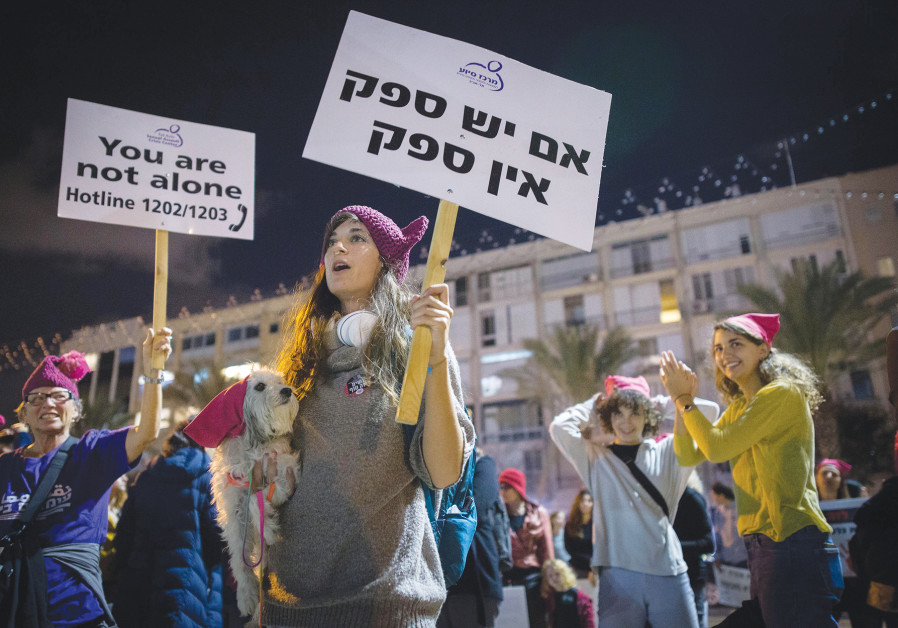Mass strike, protests call for action against domestic violence

Demonstrators in Tel Aviv protest violence against women at a rally last night, marking the International Day for the Elimination of Violence against Women. . (photo credit: MIRIAM ALSTER/FLASH90)
Women across the country will go on strike on Tuesday amid calls for greater government action to combat domestic violence, an unwelcome phenomenon that has so far claimed the lives of 24 women in Israel this year.
Women’s groups issued the call for strike action last week – the first of its kind – following the murders of two teenage girls, 13-year-old Sylvana Tsegai and 16-year-old Yara Ayoub.
The call has since led to a mass declaration of support from public and private sectors, including the Knesset, the Histadrut labor federation, local authorities, universities and private businesses.
Tens of thousands of women and men are expected to gather at Tel Aviv’s Rabin Square on Tuesday evening as the day-long demonstration reaches its climax, with organizers providing free transport from as far away as Nahariya in the North and Eilat in the South.
“The primary objective [of the strike] is to make sure that women’s lives, in all aspects, will stop being at the bottom of the priority list of our government,” protest organizers told The Jerusalem Post’s sister publication Maariv. “We are 51% of the population and it is not right that we must beg for NIS 250 million that the government decided was necessary for the emergency program [of] over five years so that women will stop being murdered.”
The emergency program includes a public rehabilitation program for victims of domestic violence; a rehabilitation program for attackers; education and public awareness efforts; and a comprehensive policy change in the Israel Police’s approach to domestic violence.
On Tuesday morning, the Women’s International Zionist Organization (WIZO) will hold a funeral march protest in memory of victims of domestic abuse, marching with coffins from their central Tel Aviv headquarters to the city’s municipality building.
“We are taking to the streets to scream out the cries of the murdered women, together with their orphaned families,” said chairperson of WIZO Israel, Gila Oshrat.
“We call on the government to immediately implement the national program to combat violence against women, that has already been approved by the government but not yet budgeted for,” she added, calling on the public to join the march.
Also on Tuesday morning, numerous local municipalities, including Tel Aviv, Ramat Gan and Modi’in will hold additional protests, open to the public, in solidarity with victims of domestic violence.
Organizers have called on the wider public to wear black on Tuesday, and for all employees to leave work at 10 a.m. for 24 minutes of silence in memory of those murdered. Over the course of the day, protests will take place at dozens of major junctions across the country, including outside Tel Aviv’s Kirya Tower and in Jerusalem’s Safra Square.
In advance of the demonstrations, President Reuven Rivlin and his wife, Nechama, met on Monday with leaders of major women’s organizations in Israel, including Na’amat president Galia Wolloch; World WIZO executive chairperson Prof. Rivka Lazovsky; and chairperson of Israel Emunah, Liora Minka.
All three organizations, along with others, advocate changes in social policy to bring about gender equality within families, at work, in society and in the economy.
During the meeting, Rivlin underscored that the struggles against domestic violence, as well as violence against women and girls, are not just women’s issues.
“Violence against women hurts all of us,” he said, “and so this is an issue for all of us. It must be a fight that crosses gender, political camps and tribes.”
Rivlin insisted that there must be no further delay in implementing the national plan for dealing with domestic violence. While acknowledging that the crucial problem of domestic violence has been thoroughly examined by a committee of trained professionals, Rivlin was adamant that the committee’s recommendations and that the plan that it drafted must not remain mere words, but must be immediately translated into action.
Prime Minister Benjamin Netanyahu was very clear on the issue at the President’s Residence on Sunday at an awards ceremony for those fighting against human trafficking in which women are the key victims.
Netanyahu, who had spoken at the awards ceremony for people who have made outstanding efforts to prevent, identify and treat victims of human trafficking, said that he would set up an inter-ministerial committee to deal with both human trafficking and violence against women. He stated that when he and his wife Sara visited a shelter for battered women in Jerusalem last week, he had been shocked by what he heard.
Referring to this, Rivlin said that Netanyahu’s statement was an important step towards ensuring the implementation of the plan and the required budget.
“We have a moral responsibility to the women who have been murdered and to many other women – to them, their parents, their children and their relatives who have been murdered this year and in previous years. We were not able to save them,” said Rivlin, “but we must act immediately and do everything we can to save the life of the next woman.”
Join Jerusalem Post Premium Plus now for just $5 and upgrade your experience with an ads-free website and exclusive content. Click here>>






Comments are closed.